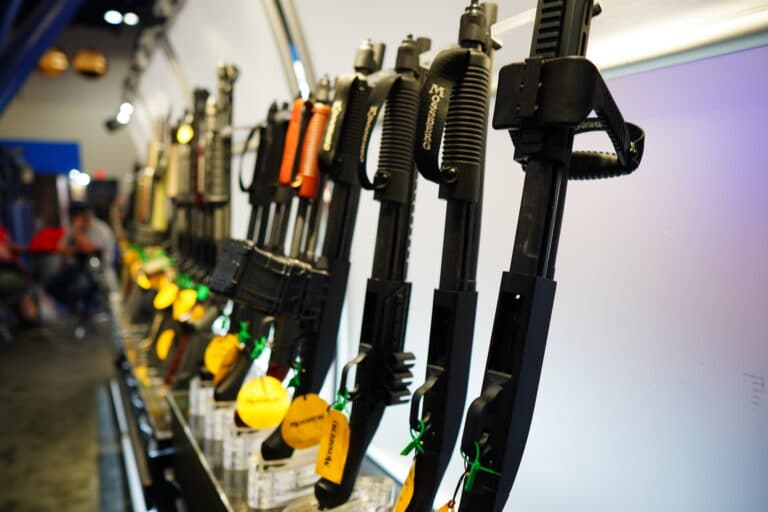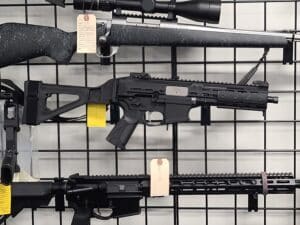Those charged with a felony by a grand jury may not be deprived of their Second Amendment rights before conviction, a federal judge has ruled.
Judge David Counts of the District of Western Texas ruled Monday that a provision in the Federal Firearms Act barring those under felony indictment from obtaining a firearm is not in line with the nation’s historical tradition of firearm regulation. He also dismissed an indictment against Jose Gomez Quiroz, a Texas man charged under the ban.
“Although not exhaustive, the Court’s historical survey finds little evidence that § 922(n)—which prohibits those under felony indictment from obtaining a firearm—aligns with this Nation’s historical tradition,” Judge Counts, an Obama appointee who was reappointed and confirmed under Trump, wrote in his opinion. “As a result, this Court holds that § 922(n) is unconstitutional.”
Ashley Hoff, the U.S. Attorney in charge of the office prosecuting the case, immediately appealed the decision to the U.S. Court of Appeals for the Fifth Circuit. Her office declined a request for comment. Mr. Quiroz’s counsel did not respond to a request for comment.
The ruling strikes a blow to federal limits on who can possess a firearm. It’s also likely to bolster the ongoing trend of criminal defense lawyers testing the limits of Second Amendment protections under the Supreme Court’s recent Bruen decision. While The Court has explicitly addressed where and how a person may keep and bear arms, it has not yet offered much guidance on the limits of who can be deprived of guns and under what circumstances. Until it weighs in, lower courts may vary widely in their interpretation of who the government can bar from buying firearms.
Andrew Willinger, Executive Director of the Duke University Center for Firearms Law, told The Reload that the decision “creates some uncertainty” for the legal status of other disqualifying factors for gun ownership because of the narrowness of the analysis performed by Judge Counts.
“I think the decision illustrates that a very narrow application of Bruen will cast doubt on a long list of gun regulations because it’s impossible for the government to come up with analogues that simply do not exist ‘because of how much this Nation has changed,'” Willinger said.
Robert Leider, Assistant Professor at George Mason University’s Antonin Scalia Law School, agreed.
“Many modern gun regulations have no historical analogue,” he told The Reload. “Lower courts should apply Bruen faithfully. But if they are overly rigid in their application of Bruen, they will quickly find the Bruen text, history, and tradition test unworkable. Bruen specifically warned about this when the decision said that the historical test was not meant to be ‘a regulatory straightjacket.'”
Willinger suggested that a different analysis under Bruen could have just as easily found a justification for the prohibition.
“The judge uses comparisons to voting and the First Amendment to suggest that there is (possibly) a tradition of excluding felons from constitutional rights accorded to ‘the people,'” he said. “But, if a court is going to reason at a higher level of generality than just looking for historical twins, it seems more faithful to Bruen to say that historical gun prohibitions were aimed at addressing the same problem (curbing violence and keeping guns away from ‘crooks’ and those who are dangerous) that Congress identified in enacting the Federal Firearms Act.”
Willinger said he expects the Fifth Circuit to place more emphasis on the parts of Heller and Bruen that said restrictions on specific categories of persons are allowable under the Second Amendment. He said that could make Monday’s decision more likely to be overturned.
“I would be somewhat surprised if the decision survives an appeal,” Willinger said. “The opinion is pretty unique in that it disregards (as dicta) Heller’s statement that felon possession bans are presumptively lawful and not in doubt. The judge gives this statement no weight at all. But the 5th Circuit appears to generally accord great deference to Supreme Court dicta. It’s an open question how exactly Heller arrived at the conclusion that felon bans are constitutional, but nothing in Bruen revoked that statement so I’d expect the 5th Circuit to be less dismissive of it than the district judge.”
“There’s also no analysis of the term ‘law-abiding citizen,’ which is used in both Heller and Bruen repeatedly,” he added. “So, I think the appeal will likely focus on those issues.”
Leider also said he thinks courts of appeals will likely moderate some early decisions by lower courts as Second Amendment jurisprudence matures after Bruen.
“Federal law prohibits the acquisition of firearms by those under felony indictment but not the continued possession of firearms already owned,” he said. “That seems like a reasonable way to accommodate those who are not prohibited from possessing firearms but who may soon become prohibited.”
Judge Counts was much less sanguine about the existence of a legal avenue to uphold the prohibition despite noting that he was personally sympathetic to the public policy implications of his ruling.
“This Court is skeptical that the Government here, or in any other court, could defend § 922(n) ‘s constitutionality,” he wrote. “Not only does the historical record lack the clear evidence needed to justify this regulation, § 922(n) evokes constitutional scrutiny in other ways.”
He cited the fact that the grand jury process by which indictments are delivered is not adversarial and is one where the rules of evidence governing criminal trials do not apply. The “freewheeling nature” of grand jury proceedings necessitates heightened scrutiny over any constitutional restrictions that their outcomes might justify, he argued.
“Some feel that a grand jury could indict a [burrito] if asked to do so,” he said.
He also noted other contexts in which persons under felony indictment are free to exercise many other constitutional rights, such as voting rights and free expression, that can be restricted only after due process.
“Those under indictment can still vote,” he noted. “The right of the people doesn’t protect violent actors or criminals. But that is not the case for those merely under indictment. Indeed, excluding those under indictment from the right of the people to keep and bear arms would operate much like prior restraints in the First Amendment concept.”
The case arose when Mr. Quiroz attempted to purchase a handgun from a local firearms dealer while under state indictment for felony burglary. According to the ruling, Quiroz denied he was indicted for a felony when filling out the required background check form and was allowed to purchase the firearm after the background check results failed to clear after seven days.
Shortly after, the background check returned with a notice that the purchase was illegal, and federal officials charged Quiroz with making a false statement during the purchase of a firearm as well as illegally receiving a firearm as a person under indictment. His lawyers filed to have his charges revisited in light of the Supreme Court’s Bruen decision.
Because Judge Counts ultimately struck down the federal prohibition against persons under federal indictment obtaining a firearm, he said that Mr. Quiroz’s false statement given during the gun’s purchase was now “immaterial.”






